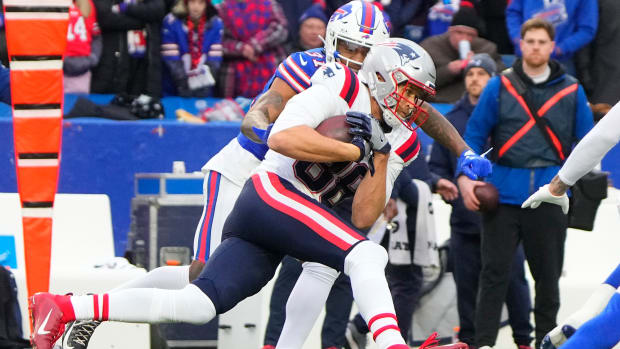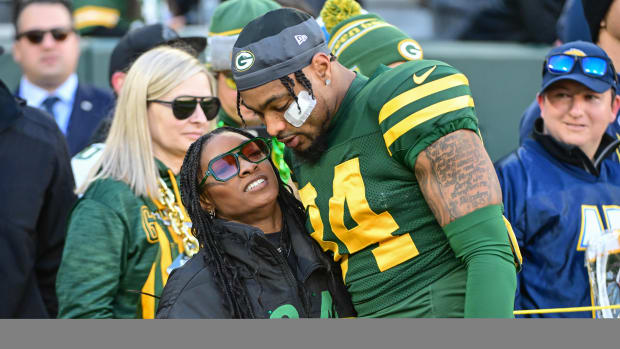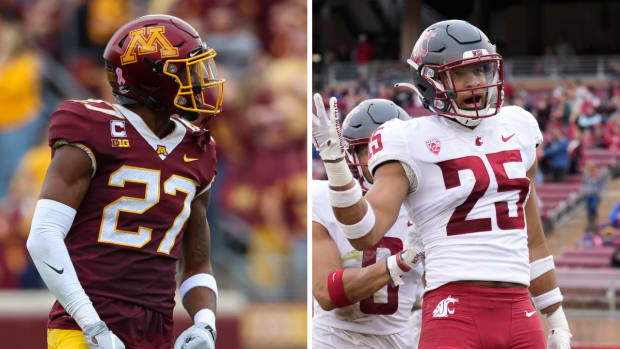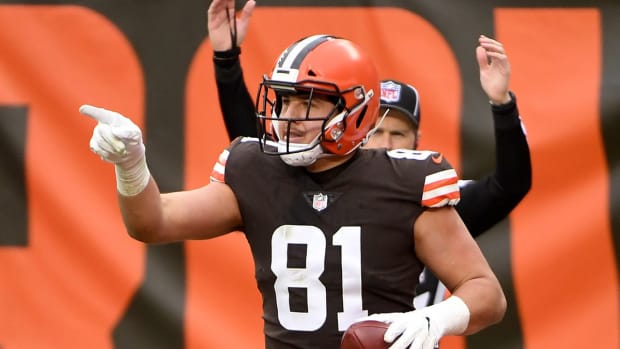Those 13 Seconds in Kansas City? How the Bills Got Over It.
The day after the Bills lost to the Dolphins in Week 3, Josh Allen wanted to share a meal with some of his closest friends on the team. Stefon Diggs has heard about Allen’s prodigiousness on the grill. But after playing in extreme heat that left him and his teammates exhausted, Diggs was willing to forgive the meal of order-in pizza and chicken wings.
Enjoying the meal, Diggs made an observation that we might have, unconsciously, about a longtime friend or spouse deep into a shared life together. Specifically, he realized he still enjoys spending time with Allen and the rest of his teammates, even though he is with them all day at work.
“I was giving everyone a hug and I just saw them at the game,” Diggs says. “I was like, s---, this is a real team.”
This is, experts in the business of team psychology and mental health say, a monumentally important admission—a sign that they are still united. That’s especially true this week, as the Bills prepare to take on the Chiefs, the team that broke Buffalo’s heart nine months ago, derailing a potential trip to the Super Bowl. Also important is what Diggs said when the conversation turned from pizza, wings and Allen’s grilling style to those moments of total numbness after the Chiefs tied last January’s game by moving the ball 50 yards in 10 seconds, followed by a field goal as the final three seconds on the clock elapsed, then won the overtime coin flip and the game, and ended Buffalo’s season.
“It’s tough,” Diggs says. “It’s like, s---, what can you do? Once the game is over, it’s over. But you have to put things into perspective. Yeah, it hurts, but some things are out of your control.”

It's been plenty of smiles for the Bills so far this season.
George Walker IV/Tennessean.com/USA Today Network
Ahead of significant rematches, or following devastating losses, coaches in the NFL have been known to turn theatrical in an effort to psychologically eviscerate a terrible moment. Rex Ryan once (literally) buried a football from the Jets’ 45–3 loss to the Patriots in the cold New Jersey dirt. Former Bears coach Matt Nagy, after the team’s “double-doink” missed field goal against the Eagles in the 2018 wild-card game, repeatedly reenacted the fateful kick during the team’s competition for their next kicker. And while there is still a chance Bills coach Sean McDermott has something positively hokey up his sleeve for the team’s critical Saturday meeting ahead of Sunday’s matchup, it seems the Bills may have been operating from a point of psychological health this entire time. They don’t actually need some grand gesture to be mentally prepared for a game that could obviously trigger some unwelcome memories.
In an effort to understand the mechanics of such motivation, Sports Illustrated reached out to a handful of mental health experts in the athletic space to talk about the most effective way to bury a loss on the magnitude of the “13 seconds” game. While there are different tools in any therapist’s belt, most agreed that a general acceptance of what happened, the open and honest discussion of feelings, an eventual focus on the positives gleaned from the process that brought them there and a constructive discussion on what could be learned from the moment was a formidable recipe. While we might all enjoy the idea of McDermott lying on a bed of spikes for 13 seconds or spending 13 seconds in a pit of live rattlesnakes to atone for various defensive and special-teams missteps at the end of the game, the prevailing idea is that the right processes could avoid the need for a grand gesture.
What if, even when the outside world defines them by 13 seconds, the Bills don’t have to? Or, as Diggs puts it: “If I hang onto it, it’s something that weighs me down. And I don’t like things weighing me down.”
Dr. Mark Ayoagi, the co-director of sport and performance psychology and a professor in the graduate school of professional psychology at the University of Denver, spent time under three different coaching regimes with the Broncos.
While he is careful not to make any blanket statements about football players or athletes in general, there are some critical points to understand about the competitive brain.
The first is that, “they have to have some baseline of mental health to have made it to this point [in professional sports],” he says. Years and years of high-pressure competition, winning and losing force them to moderate and not stake so much mental equity on one performance.
“They know that if you’re on the losing side it sucks and the winning side it’s great, but that both of them are gone by Monday,” he says. “They don’t carry this around like a fan might. Or through an entire offseason like a fan might. It’s not that they don’t care; it’s that they have more experiences dealing with it.”
The second point: Ayoagi finds athletes to be in a better general headspace than the average population when sports performances are going well, but a lower general headspace when they are not. The issue, he says, is that many athletes feel they are unable to find a sympathetic ear due to the public knowledge of their high salaries and the perception that they can’t vent their frustrations because they play a game for a living.
“It’s like the question: Is sports more protective or exacerbating of substance use?” Ayoagi says. “The answer is both. Athletes use less frequently, but when they use, they use more. It’s an analogy that holds true for mental health. There’s a lot of protective factors, but they also have a white-hot spotlight on them. And when they are not in a good space, all of a sudden their social support is gone. They can’t talk to anyone about this. [They think], who wants to hear from the guy with the $4 million contract?”
The plus side to these heightened negative feelings is that even a brief intervention can yield positive results in helping an athlete reframe or reshape a difficult moment. Ayoagi, for example, utilizes the baseline theory behind acceptance and commitment therapy (ACT), which encourages patients to accept the fact that our brain throws weird, anxious, scary, grotesque or depressing thoughts, images and stories at us all the time, and learning to accept this default feature and pivot toward something personally meaningful is an effective way of combating stressors.
In short, learning that we don’t have to believe our own thoughts—that those thoughts we experience on a minute-by-minute basis have no direct power over us—is an incredibly liberating moment for all athletes across the board (and almost all people in general).
Ayoagi also referenced a study done by Hap Davis, a Canadian sport psychologist, who measured the brain activity of swimmers who failed to medal during a critical, career-defining race. In rewatching the video of their race, the swimmers showed the same brain signatures as those of depressed patients. The swimmers were introduced to cognitive behavioral therapy (CBT), a classic psychotherapeutic method that prompts a patient to foster a more accurate, less destructive and negatively biased view of their own thoughts (an example: This race didn’t ruin my career, it actually provided me the opportunity to notice a flaw in my stroke that will make me a far better swimmer). After a 20-minute session of CBT, their brain signatures improved dramatically when watching the same video again. They acknowledged the hurt and began working constructively toward a better mental space.
Broadly, as it relates to a modern NFL team getting over a loss significant enough to have its own signature nickname, this Bills team exists at a time when there are more therapeutic prescriptions that can be engaged both consciously in a one-on-one setting, and globally from a messaging standpoint.
“In this very brief intervention [with the swimmers] their brain switched to: ‘What am I going to do next time?’ rather than, ‘What went wrong last time?’” Ayoaji says. “That’s a really long way of saying that if the Bills, in this scenario, had any acknowledgement of what happened last time, I’m not too worried about it.
“In a team setting, this is where leadership becomes critical. In pressurized moments, we’re going to be conditioned to think about what feels familiar here. And if what feels familiar in a pressurized game against the Chiefs is ‘Oh s---,’ then that’s what will come out.”
Press conferences are often dreadful events, the splattering of various platitudes against the backdrop of some team-sponsored motor-oil company. That is, until you know what you’re looking for.
Earlier this week, Allen, when asked about the Chiefs, said something we may have passed off as boring without a primer on foundational mental health: “We try and practice our mindset. Stick to what Coach McDermott tells us, which is [be] playoff-caliber, the best versions of ourselves every time we step into this building. That’s all it is. We’re taking it day by day, week by week, trying to put our best foot forward.”
He added: “There’s a lot of things you can take away from that game that help you. Whether it’s situational football, understanding the flow of games, knowing the importance of home playoff games—again, that’s neither here nor there right now, but situationally, we can take a lot from [the loss].”
McDermott, at his own press conference, said: “[The 13 seconds loss] did happen. It’s part of our past. But it’s also part of our past. Right?”
He added: “We’re not afraid to learn from things. That’s what you do in life; that’s what you do in football … sometimes we get the results we’re looking for and sometimes we don’t. At the end of the day, we have to continue to stay resilient and persistent both in life and in sports.”
Amid that small word salad (that may have lulled you to sleep) lies evidence that the Bills did exactly what some experts would recommend. McDermott acknowledged that it happened. Allen talked about the positives, such as learning about the flow of games and absorbing different critical in-game management tactics. Both doubled down on the importance of their process.
The focus on process-oriented versus outcome-oriented gratification has been a huge development in the world of sport psychology, with more athletes being taught to value their individual growth and controllable progress instead of judging themselves based on wins and losses—an especially tumultuous practice given that the NFL has only one champion at the end of every season.
“I’ve even noticed in some [elementary] schools they talk about a growth mindset,” says Jamie Shapiro, a professor at the University of Denver’s graduate school of psychology who has done extensive private coaching work with paralympic athletes, as she tries to get them less focused on the heavy weight of medal counts. “Learning through adversity, challenges and through losses. I’ll see posters in elementary schools now that talk about growth mindset versus a fixed mindset. And I’m like, ‘Oh, I’m teaching that to my grad students. That’s not something I learned in school or as a gymnast.”
Steve Magness, a performance expert who has written books on both toughness and peak performance, noted in his latest book, Do Hard Things: “If we all took the viewpoint of Ricky Bobby from the movie Talladega Nights that ‘if you aren’t first, you’re last,’ we would be in trouble. … Shifting the focus toward process-oriented goals, such as the effort you put forth, helps remedy those situations.”
The Bills’ press conferences allude to what Gregory Sullivan, director of positive coaching and athletic leadership at the University of Missouri, said should have been happening all along. If there is a process a team can cling to, a loss doesn’t pummel its collective psyche.
If everyone is still hanging out together, saying what they’re supposed to say …
“I don’t think I take that as a small victory; I take that as a huge one,” Sullivan says. “It’s validation of what you are doing as a coaching staff is working, whatever process you have in place.”
Before each game, Diggs leans on the manifestation prowess of Taiwan Jones, the Bills’ 34-year-old special teams ace. Diggs said that Jones helps him get mentally prepared for each week by envisioning shared successes.
Jones, who spent a significant portion of time with Diggs training during the pandemic, said he took it upon himself to be a “positive charge” to the locker room after one head coach told him that players are either plusses or minuses in every situation when they walk through the door.
It shaped Jones’s experiences and is likely a significant reason why he’s carved out a lengthy career as a running back, then a cornerback and now a return specialist. He has been voted a Bills captain each of the past two years.
“It’s all about being positive and having great energy,” Jones said in our phone interview after Thursday’s practice. “No matter what I’m going through, I’m putting a smile on my face and picking up the energy in the room. That might be challenging someone or finding out what makes them tick—I try and push those buttons. That only comes through spending time together.”
Over the course of a few minutes, Jones identifies different pillars set up through the organization that share in the gargantuan mindset lift. There’s Von Miller at the lunch table, running one of his own famous seminars on envisioning a championship. Miller’s use of his own vivid dreams and visualization techniques is legendary across his three stops, in Denver, Los Angeles and now Buffalo.
There’s Dr. Desaree Festa, the sport psychologist for the Bills and Sabers, giving advice on “how powerful the mind can be, and how your words can become your reality.” Known by the team as “Dr. Dez,” she received a game ball after clinching the division last season (the Bills, citing team policy, declined to make Festa available for an interview).

Jones continues to be a positive force on special teams and in the locker room.
Rich Barnes/USA Today Sports
Pulling all the strings, there is McDermott, who began the 2022 season introducing the concept of Kaizen. It’s a Japanese term that captures the spirit of persistent improvement, a process-driven technique rooted in daily actions that make the sum of a business better from each arm of the enterprise.
“I’ve learned a lot from coach McDermott,” Jones says. “What he preaches, the guys he brings into this locker room, it’s easy for me to buy into what he’s selling.”
It could help explain why his message, at least five days into Chiefs week, has contained all the flair of a Bill Belichick monologue. Basically, Jones says, McDermott has been telling players that this week is any other week. The Chiefs happen to be the team coming up on the schedule. Everything else has already happened, has already been digested, has already been processed. Thursday’s practice was about Thursday’s practice.
From the outside, it’s easy to take a cynical viewpoint on all of this, likening the whole process to some kind of Michael Scott–ian ploy to get his workers to sell more paper. You may think of your boss, stuffed in a quarter-zip pullover bearing the company logo, telling you to become the best version of yourself, eliciting a lengthy roll of the eyes. Thanks to the completely trodden world of coach-speak and athlete-speak, a cottage industry of comedians and other social media personalities exist solely to make fun of it.
The flip side is that there are teams everywhere adopting targeted versions of these practices. They’re bringing together hundreds of diverse employees from different socioeconomic, political, racial and religious backgrounds, helping them recover together from incredibly tumultuous and universal issues we all struggle with, but on a larger scale. The idea that the Bills don’t have to be beholden to their past should be as exciting to any of us as it has been for Diggs, or Jones, or Allen or McDermott.
There is something quite radical and liberating about the theory that those 13 seconds existed for just 13 seconds in January. The Bills, on Sunday, will try to convince us of as much.
More NFL Coverage:
• Week 6 Preview: Chiefs-Bills Takes Center Stage
• Mailbag: Ron Rivera’s Job Security and More
• Taysom Hill Proves He Can Still Carry the Saints
• The Giants’ Recent History Is Now History







































